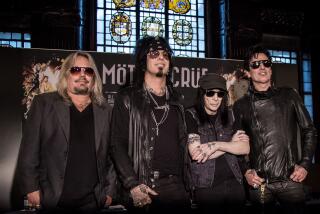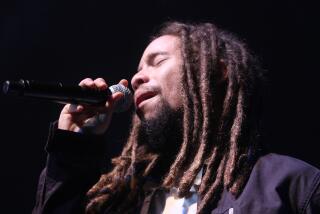WAILERS DEALING WITH THEIR SHARE OF ADVERSITY
- Share via
When the Wailers kicked into the “We don’t need no trouble” coda to Bob Marley’s “War” on Sunday at the Roxy, the Jamaican band that was once led by the late reggae giant had no difficulty identifying with the lyric. The Wailers have seen little but trouble since Marley died of cancer in 1981.
The latest blow came in April, when drummer Carlton Barrett was murdered in his Kingston, Jamaica home.
But the band’s recent low profile--it just returned to active touring earlier this year--was chiefly due to legal difficulties with the Marley estate. Six months after Marley’s death, the band members say, they accepted a one-time payment by lawyers for the estate, in exchange for signing a contract that required an exclusive recording agreement with Marley’s widow Rita and a fine-print provision relinquishing control of the name “Wailers.”
This left the band in a legal limbo, broke and unable to pursue a label deal for the two albums they’d recorded. Their live appearances were limited to such occasional events as the 1984 tour supporting the release of Bob Marley’s “Legend” album.
“They didn’t have control of the name but they had a document signed by us waiving our rights as the Wailers and giving them control,” explained guitarist-vocalist Junior Marvin during a poolside interview at the band’s hotel last weekend.
The Wailers say that they signed the contract without legal counsel, and they now dispute its validity. They’ve resumed activity after filing an $8-million suit against the estate, demanding an audit of royalty payments made to the estate since Marley’s death.
But the Wailers suffered another serious blow with Barrett’s death in an apparent lovers’ quarrel. Carlton and his brother, bassist Aston (Family Man) Barrett, had defined reggae’s rhythmic development in Jamaica since their band the Upsetters worked with producer Lee Perry in the late ‘60s. The Barrett brothers joined forces with the Wailers in 1970.
“I have no better choice but to go ahead,” reflected Aston Barrett. “Survival is a must. The chemistry has changed but we’re still pushing on. There is no end to this music.
“When most people speak of the Wailers, they act like Bob was carrying the whole thing all the time, but it existed even before Bob’s time. The Wailers asked me personally to bring my rhythm section and their vocal section to come (together) as one. That’s what made the Wailers strong internationally.”
But it also created a void in reggae when Marley died. The Wailers could probably please crowds for years just by playing Marley’s greatest hits, but the group is intent on asserting its own identity now.
With three new members-- drummer Cornell Marshall, former Third World percussionist Irvin (Carrot) Jarrett and keyboardist Martin Batista--being worked into the lineup, the new edition of the Wailers is still in the shakedown mode. But Sunday’s first set at the Roxy was a promising new beginning despite sound problems.
The Wailers are understandably upset by what they consider exploitative treatment, but the group only wants to put the distractions behind them in order to focus again on creating music.
“That was a real bad experience but we managed to get through it,” Marvin said of the legal problems. “We’re at a point now where we can work on our own music and try to get with a major label.
“We hope to link up with (producer) Alex Sadkin, do an album with our own songs and project from that point onward--be positive and get away from the negative stuff.”
More to Read
The biggest entertainment stories
Get our big stories about Hollywood, film, television, music, arts, culture and more right in your inbox as soon as they publish.
You may occasionally receive promotional content from the Los Angeles Times.










